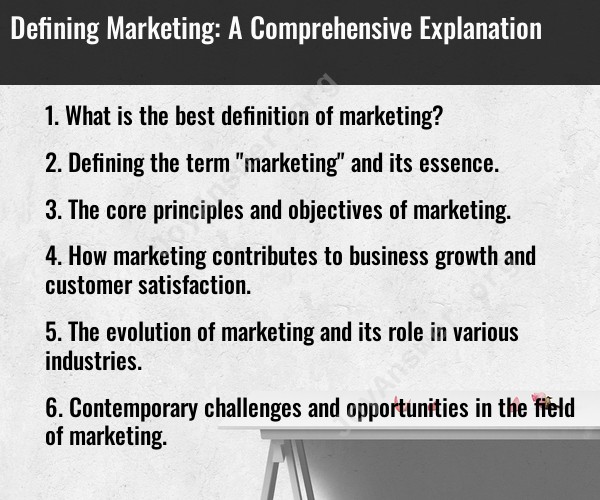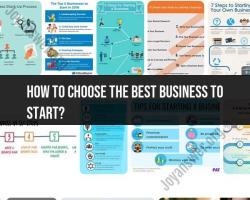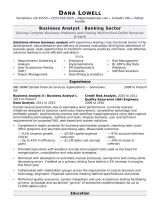What is the best definition of marketing?
Marketing is a multifaceted concept, and there are several definitions, but a comprehensive explanation of marketing is:
Marketing is the strategic process of identifying, creating, communicating, delivering, and exchanging value to satisfy the needs and wants of a target audience in a way that benefits both the customer and the organization.
This definition encompasses the core principles and components of marketing:
Strategic Process: Marketing is not haphazard; it involves careful planning, analysis, and decision-making to achieve specific goals.
Identifying: Understanding and recognizing the needs and preferences of a target audience is central to marketing. This involves market research to gain insights into customer behavior.
Creating: Marketers develop products, services, or solutions that address the identified needs and wants of their target audience. This also includes product design, branding, and packaging.
Communicating: Effective marketing involves clear and persuasive communication with customers through various channels such as advertising, public relations, social media, and content marketing.
Delivering: It's not just about creating products or services; it's also about ensuring they reach the customers efficiently and meet their expectations regarding availability, convenience, and quality.
Exchanging Value: Marketing is about creating value for both the customer and the organization. Customers should perceive the product or service as valuable, while the organization should achieve its business objectives, including profitability.
Customer-Centric: Marketing revolves around understanding and meeting customer needs and wants. It's about building relationships with customers, satisfying them, and retaining their loyalty.
Mutually Beneficial: Marketing should result in a win-win situation for both the customer and the organization. Customers should benefit from the product or service, while the organization should achieve its financial and strategic goals.
In essence, marketing is about aligning the offerings of a company with the needs and desires of its target market, all while delivering value and maintaining a profitable relationship. It's a dynamic field that adapts to changes in consumer behavior, technology, and market conditions, and it plays a crucial role in the success of businesses and organizations across various industries.
Defining the term "marketing" and its essence
Marketing is the process of identifying, creating, and delivering value to customers. It involves understanding customer needs and desires, developing products and services that meet those needs, and communicating the value of those products and services to customers.
The essence of marketing is to create and maintain customer relationships. By understanding and meeting customer needs, businesses can build customer loyalty and profitability.
The core principles and objectives of marketing
The core principles of marketing include:
- Customer focus: Businesses should focus on understanding and meeting the needs of their customers.
- Value proposition: Businesses should create and communicate a value proposition that explains why their products or services are the best choice for customers.
- Relationship building: Businesses should focus on building long-term relationships with their customers.
The objectives of marketing include:
- Increase brand awareness: Businesses need to make customers aware of their brand and its products or services.
- Generate leads: Businesses need to generate leads, which are potential customers who have expressed an interest in their products or services.
- Convert leads into customers: Businesses need to convert leads into customers by convincing them to buy their products or services.
- Retain customers: Businesses need to retain customers by providing them with a positive experience and keeping them engaged with their brand.
How marketing contributes to business growth and customer satisfaction
Marketing contributes to business growth by helping businesses to attract new customers, increase sales, and build brand loyalty. It also contributes to customer satisfaction by helping businesses to understand and meet customer needs.
When businesses focus on creating and delivering value to customers, they are more likely to be successful. By understanding customer needs and developing products and services that meet those needs, businesses can build customer loyalty and profitability.
The evolution of marketing and its role in various industries
Marketing has evolved over time to reflect the changing needs of businesses and consumers. In the early days of marketing, businesses focused on selling products. However, as consumers became more sophisticated, businesses began to focus on building relationships with customers and creating value for them.
Today, marketing is used in a variety of industries, including:
- Consumer goods: Consumer goods companies use marketing to promote and sell their products to consumers.
- Business-to-business (B2B): B2B companies use marketing to promote and sell their products and services to other businesses.
- Non-profit: Non-profit organizations use marketing to raise awareness of their causes and to attract donors and volunteers.
Contemporary challenges and opportunities in the field of marketing
Some of the contemporary challenges facing marketers include:
- The rise of digital marketing: Digital marketing has become increasingly important in recent years. However, it can be challenging to keep up with the latest trends and technologies.
- The globalization of markets: Businesses are increasingly operating in global markets. This presents new challenges, such as cultural differences and language barriers.
- The growth of social media: Social media has become a powerful tool for marketers. However, it can be challenging to use social media effectively.
Despite the challenges, there are also a number of opportunities in the field of marketing. For example, new technologies are emerging all the time that can be used to improve marketing campaigns. Additionally, the growth of global markets presents new opportunities for businesses to expand their reach.
Overall, marketing is a dynamic and ever-evolving field. Marketers need to be adaptable and creative in order to be successful.













